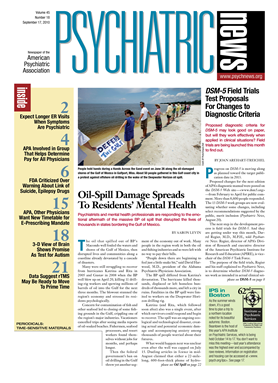APA, along with other physician and nonphysician mental health groups, is asking the AMA's Relative Value Update Committee (RUC) to review a number of psychiatric codes and is sending some other codes—those involving evaluation and management, frequently used by psychiatrists—back to the CPT (Current Procedural Terminology) Editorial Panel for a rewrite.
As part of the federal government's five-year review of CPT codes, APA has been surveying members about psychiatric codes and their “relative work values”—the component of the Medicare payment formula that places a value on procedures performed by clinicians.
Psychiatrist Ronald Burd, M.D., APA's representative to the RUC and chair of the APA Committee on RBRVS, Codes, and Reimbursement, said the survey of codes not involving evaluation and management is complete, and APA will be making a presentation to the RUC in early October. Psychiatric News has published several notices about the survey (March 19, April 2, April 16, May 7, May 21), and an AMA PowerPoint presentation about the RUC and the process of code review is posted on the APA Web site.
As part of the five-year review, it is up to specialty societies like APA to survey a representative sample of physicians in their specialty for their evaluation of the work involved in a service or procedure relative to a set of other “reference” services or procedures. Medicare payment is based on the Resource-Based Relative Value Scale (RBRVS), a formula devised in the 1980s by health economist William Hsiao, Ph.D., to provide an approximation of a rational payment scheme, based on measures of the relative physician resources involved in providing a service, including a “physician work” component.
Medicare and the RUC define the physician work component as reflecting the following factors:
•.
The time it takes to perform the service,
•.
Technical skill and physical effort required,
•.
Mental effort and judgment required, and
•.
Amount of stress associated with the physician's concern about iatrogenic risk.
The survey results and APA's recommendations will be reviewed by the RUC, and recommendations regarding changes in work values will be passed on to the federal Centers for Medicare and Medicaid Services.
More important for psychiatry, the RUC has already agreed that a total of 14 codes—the “psychotherapy with evaluation and management” codes, which are used most frequently by psychiatrists and the two psychiatric evaluative interview codes—should not just have their work value reviewed, but should be sent back to the CPT editorial panel to determine if they need to be rewritten.
The psychotherapy with E/M codes are 90805, 90807, 90809, 90811, 90813, 90815, 90817, 90819, 90822, 90824, 90827, and 90829. The psychiatric diagnostic or evaluative interview codes are 90801 and 90802.
Burd explained that the codes, which are based on the 20-minute psychotherapy code written two decades ago, no longer reflect the complexity of work that psychiatrists do when evaluating patients who may have multiple conditions.
“We need a more robust code set that accurately distinguishes between the different intensities of psychiatric services,” Burd said. “We'd like to see a change in the way the CPT describes the service and a corresponding change in its valuation [in the payment formula], because we think the work we do is undervalued.”

